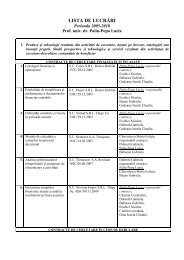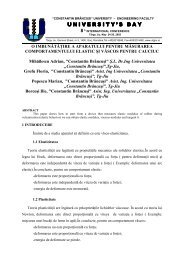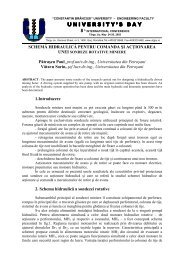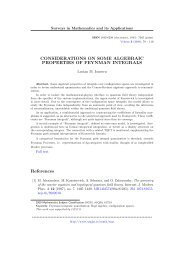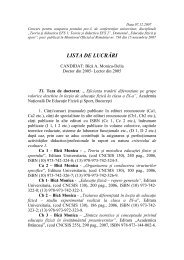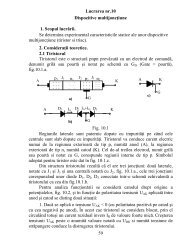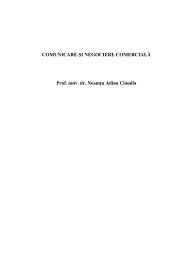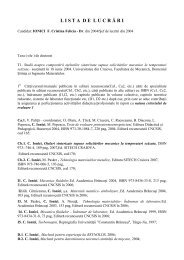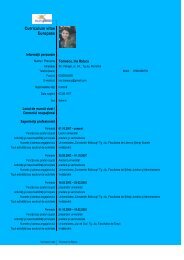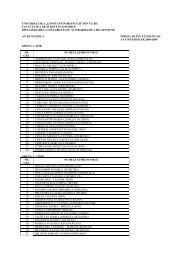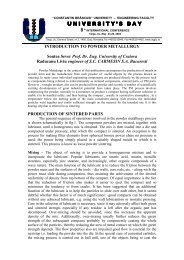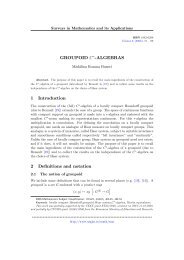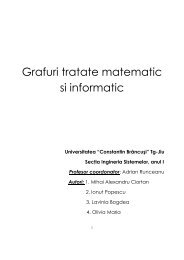Analele Universităţii “<strong>Constantin</strong> Brâncuşi” din Târgu Jiu, Seria Litere şi Ştiinţe Sociale, Nr. 2/<strong>2008</strong>aceasta, în primul rând, pentru că valorile suntimanente şi transcendente atât obiectelorvalorizate, cât şi subiectelor valorizatoare. Estede mare interes ideea exprimată de un personajshakespearean în „Trolius şi Cresida”:„valoarea nu stă în bunul nostru plac…;valoarea e şi-n ceea ce prin sine-i preţios şi înacela care preţuieşte”. Altfel spus, valoarea seconstituie numai atunci când şi acolo undeceva (în principiu orice) prezintă pentru cineva(obligatoriu, fiinţa capabilă să aprecieze) oimportanţă mai mare sau mai mică, implicândo relaţie specifică între subiect şi obiect.O definiţie posibilă: Valoarea este orelaţie de apreciere a unor bunuri sau creaţii, învirtutea corespondenţei dintre însuşirile lor şinăzuinţele omului.Pe cale de consecinţă, se poate asumacă valoarea nu este nici atribut intrinsec alunor obiecte (materiale sau ideale), nici atributintrinsec al subiectului, ci un mod specific deraportare preferenţială şi deziderativă asubiectului faţă de obiect, pe baza unor criteriisociale 7 .Sistemul de valori care conferăidentitate structurală unei comunităţi estedefinit „ca sinteză a componentelor culturale şide civilizaţie admise ca legitime la nivelcomunitar” 8 . În temeiul interacţionalismuluisimbolic, cultura este un sistem de «simboluricolective». Trecând peste multitudineadefiniţiilor date culturii, consider că definiţialui J. Plano este una cuprinzătoare şiedificatoare pentru studiul de faţă: Culturareprezintă ansamblul de modelecomportamentale însuşite şi transmise social,specifice unei societăţi. Ca element definitoriual unui grup naţional, ea se dezvoltă şi sepăstrează prin învăţare, limbă, cunoaştere,folclor, credinţă, obiceiuri, tradiţii, instituţii,atât oficiale, cât şi neoficiale. Pe scurt, printotalitatea experienţei sociale. Într-o esenţămaximă, având în vedere inclusiv componentasa politică, se poate spune că un sistem politiceste modelat de factorii culturali, iar sistemulpolitic, la rândul lui, poate provoca modificăriîn plan cultural, influenţând alte modelecomportamentale ale societăţii. Aici se impuneo altă remarcă, anume aceea că existenţa unorof the human axiological universe. Just likevalue judgements do not identify themselveswith judgements about value, in the same waythey do not resume themselves to onticuniverse, not to the gnoseological one. Thishappens firstly because values are immanentand transcendent to valued objects and tovalorising subjects. It is of great interest the ideaexpressed by a Shakespearian character in“Troilus and Cressida”: „ value dwells not inparticular …; It holds his estimate and dignity /As well wherein 'tis precious of itself /As in theprizer”. To put it in other words, values is whenand where something ( mainly anything) hasless or more significance for someone (a humanbeing capable of appreciation, compulsorily),involving a specific relation between the subjectand the object.A possible definition: Value is anappreciation relation of some goods orcreations, in virtue of their correspondencebetween their features and man’s hopes.Consequently, we may assume thatvalue is not an intrinsic attribute of some objects(either material or ideal), not an intrinsicattribute of the subject, but a specific way ofpreferential and desiderative report of thesubject towards the object based on socialcriteria 22 .The system of values that offersstructural identity to a community is defined as“a synthesis of cultural and civilisationcomponents admitted as legitimate atcommunitarian level” 23 . Based on the symbolicinteractions, culture is a system of “collectivesymbols”. Passing over the multitude ofdefinitions given to culture, I believe thatJ.Plano’s is conclusive and edifying for ourstudy: Culture is the assembly of behaviourpatterns acquired and socially transmitted,specific to one society.As a defining element of a national group, itdevelops and preserves by studying, language,knowledge, folklore, faith, habits, traditions,institutions, both official and not official. Inshort, through the totality of social experience.In a maximum essence, taking intoconsideration its political component also, wemay say that a political system is modelled byAnnals of the „<strong>Constantin</strong> Brâncuşi” University of Târgu Jiu, Series Letters and Social Sciences, No. 2/<strong>2008</strong>10
Analele Universităţii “<strong>Constantin</strong> Brâncuşi” din Târgu Jiu, Seria Litere şi Ştiinţe Sociale, Nr. 2/<strong>2008</strong>subculturi sau a unor contra-culturi,depistabile prin alienarea unor grupuriimportante de grupul cultural dominant, potproduce ostilităţi şi tensiuni care, la rândul lor,pot avea ca rezultat violenţa, represiunea şi, înultimă instanţă, revoluţia sau războiul civil.Iată o teză de care voi ţine cont în analizademocraţiei. Nivelul (subsistemul) culturii, alconştiinţei sociale, al ideologiei şi vieţiispirituale coexistă în sistemul social împreunăcu nivelul (subsistemul) raporturilor societateumană-natură; nivelul (subsistemul)structurilor sociale şi al relaţiilor specifice;nivelul (subsistemul) vieţii comunitare.Apoi, în subsistemul culturii politicesunt cuprinse: ideile, concepţiile, formele deconştiinţă specifică – politică, morală,filosofică, artistică, juridică, religioasă; reprezentările, mentalităţile, opiniile,stările de spirit, atitudinile.Succint, reprezentând sfera vieţiispirituale a individului, condiţia culturii areun dublu sens: ea condiţionează şi estecondiţionată de mediul social.Interesează impactul ei asupra condiţieisistemului politic; valorile, aspiraţiile produccomportamente reprezentative la nivelindividual, grupal, naţional, internaţional(îndeosebi prin globalizare). Cultura creeazătradiţie, formează sisteme autonome decunoştinţe, modelează structura unor instituţii(creează o altă totalitate a experienţeisociale) 9 .Istoria reprezintă martorul de controlasupra valorilor şi utilităţilor diferitelorsocietăţi politice. Această judecată poate fiemisă atât pentru regimurile democratice, câtşi pentru cele non-democratice, îndeosebi înprivinţa legitimităţii şi legitimării lor.Democraţia este forma politică ce „şi-adovedit în timpuri îndelungate, o marecapacitate de învăţare şi un imens potenţial detransformare” 10 ; ea s-a manifestat ca idee aguvernării de către cei mulţi, transformândviaţa politică aproape în aceeaşi perioadă atâtîn Atena (şi alte oraşe – state greceşti), cât şiîn statul – cetate Roma 11 . Mulţi autori auconsiderat că exclamaţia lui Giovani Sartori:cultural factors and political system, in its turn,can cause alterations at cultural level,influencing other behaviour patterns of thesociety. This requires another observation,namely that the existence of subcultures orcounter-cultures, that may be depicted byalienating important groups from the dominantcultural group, can cause ostilites and tensionsthat, in their turn, may result into violence,repression and last revolution or civil war. Thisis a thesis that I shall take into consideration inanalyzing democracy. The level (subsystem) ofculture, social consciousness, ideology andspiritual life work together within the socialsystem together with the level (subsystem) ofthe reports between human society – nature; thelevel (subsystem) of social structures andspecific relations; the level (subsystem) ofcommunitarian life.Then, in the system of political culture,there are included: Ideas, conceptions, specific conscienceforms – political, moral, philosophical,artistic, juridical, religious; Representations, mentalities, opinions,states of spirit, attitudes.Briefly, representing the individualspiritual sphere, the condition of culture has adouble meaning: it conditions and it isconditioned by the social environment.We are interested on its impact upon thecondition of the political system; values,aspirations cause representatives behaviours atindividual, group, national, international level(especially through globalization). Culturecreates tradition, forms autonomous knowledgesystems, models the structure of institutions(creates another tonality of the socialexperience) 24 .History is the control witness uponvalues and utilities of different politicalsocieties. This judgement may be issued bothfor democratic systems, and for nondemocraticsystems, especially regarding theirlegitimacy and legitimating.Democracy is the political form that“has proven in time a great capacity of learningand a great potential of transformation” 25 ; it hasdeveloped as an idea of government by theAnnals of the „<strong>Constantin</strong> Brâncuşi” University of Târgu Jiu, Series Letters and Social Sciences, No. 2/<strong>2008</strong>11
- Page 5: CUPRINS:1. CUNOAŞTERE - CULTURĂ
- Page 8 and 9: Analele Universităţii “Constant
- Page 10 and 11: Analele Universităţii “Constant
- Page 14 and 15: Analele Universităţii “Constant
- Page 16 and 17: Analele Universităţii “Constant
- Page 18 and 19: Analele Universităţii “Constant
- Page 20 and 21: Analele Universităţii “Constant
- Page 22 and 23: Analele Universităţii “Constant
- Page 24 and 25: Analele Universităţii “Constant
- Page 26 and 27: Analele Universităţii “Constant
- Page 28 and 29: Analele Universităţii “Constant
- Page 30 and 31: Analele Universităţii “Constant
- Page 32 and 33: Analele Universităţii “Constant
- Page 34 and 35: Analele Universităţii “Constant
- Page 36 and 37: Analele Universităţii “Constant
- Page 38 and 39: Analele Universităţii “Constant
- Page 40 and 41: Analele Universităţii “Constant
- Page 42 and 43: Analele Universităţii “Constant
- Page 44 and 45: Analele Universităţii “Constant
- Page 46 and 47: Analele Universităţii “Constant
- Page 48 and 49: Analele Universităţii “Constant
- Page 50 and 51: Analele Universităţii “Constant
- Page 52 and 53: Analele Universităţii “Constant
- Page 54 and 55: Analele Universităţii “Constant
- Page 56 and 57: Analele Universităţii “Constant
- Page 58 and 59: Analele Universităţii “Constant
- Page 60 and 61: Analele Universităţii “Constant
- Page 62 and 63:
Analele Universităţii “Constant
- Page 64 and 65:
Analele Universităţii “Constant
- Page 66 and 67:
Analele Universităţii “Constant
- Page 68 and 69:
Analele Universităţii “Constant
- Page 70 and 71:
Analele Universităţii “Constant
- Page 72 and 73:
Analele Universităţii “Constant
- Page 74 and 75:
Analele Universităţii “Constant
- Page 76 and 77:
Analele Universităţii “Constant
- Page 78 and 79:
Analele Universităţii “Constant
- Page 80 and 81:
Analele Universităţii “Constant
- Page 82 and 83:
Analele Universităţii “Constant
- Page 84 and 85:
Analele Universităţii “Constant
- Page 86 and 87:
Analele Universităţii “Constant
- Page 88 and 89:
Analele Universităţii “Constant
- Page 90 and 91:
Analele Universităţii “Constant
- Page 92 and 93:
Analele Universităţii “Constant
- Page 94 and 95:
Analele Universităţii “Constant
- Page 96 and 97:
Analele Universităţii “Constant
- Page 98 and 99:
Analele Universităţii “Constant
- Page 100 and 101:
Analele Universităţii “Constant
- Page 102 and 103:
Analele Universităţii “Constant
- Page 104 and 105:
Analele Universităţii “Constant
- Page 106 and 107:
Analele Universităţii “Constant
- Page 108 and 109:
Analele Universităţii “Constant
- Page 110 and 111:
Analele Universităţii “Constant
- Page 112 and 113:
Analele Universităţii “Constant
- Page 114 and 115:
Analele Universităţii “Constant
- Page 116 and 117:
Analele Universităţii “Constant
- Page 118 and 119:
Analele Universităţii “Constant
- Page 120 and 121:
Analele Universităţii “Constant
- Page 122 and 123:
Analele Universităţii “Constant
- Page 124 and 125:
Analele Universităţii “Constant
- Page 126 and 127:
Analele Universităţii “Constant
- Page 128 and 129:
Analele Universităţii “Constant
- Page 130 and 131:
Analele Universităţii “Constant
- Page 132 and 133:
Analele Universităţii “Constant
- Page 134 and 135:
Analele Universităţii “Constant
- Page 136 and 137:
Analele Universităţii “Constant
- Page 138 and 139:
Analele Universităţii “Constant
- Page 140 and 141:
Analele Universităţii “Constant
- Page 142 and 143:
Analele Universităţii “Constant
- Page 144 and 145:
Analele Universităţii “Constant
- Page 146 and 147:
Analele Universităţii “Constant
- Page 148 and 149:
Analele Universităţii “Constant
- Page 150 and 151:
Analele Universităţii “Constant
- Page 152 and 153:
Analele Universităţii “Constant
- Page 154 and 155:
Analele Universităţii “Constant
- Page 156 and 157:
Analele Universităţii “Constant
- Page 158 and 159:
Analele Universităţii “Constant
- Page 160 and 161:
Analele Universităţii “Constant
- Page 162 and 163:
Analele Universităţii “Constant
- Page 164 and 165:
Analele Universităţii “Constant
- Page 166 and 167:
Analele Universităţii “Constant
- Page 168 and 169:
Analele Universităţii “Constant
- Page 170 and 171:
Analele Universităţii “Constant
- Page 172 and 173:
Analele Universităţii “Constant
- Page 174 and 175:
Analele Universităţii “Constant
- Page 176 and 177:
Analele Universităţii “Constant
- Page 178 and 179:
Analele Universităţii “Constant
- Page 180 and 181:
Analele Universităţii “Constant
- Page 182 and 183:
Analele Universităţii “Constant
- Page 184 and 185:
Analele Universităţii “Constant
- Page 186 and 187:
Analele Universităţii “Constant
- Page 188 and 189:
Analele Universităţii “Constant
- Page 190 and 191:
Analele Universităţii “Constant
- Page 192 and 193:
Analele Universităţii “Constant
- Page 194 and 195:
Analele Universităţii “Constant
- Page 196 and 197:
Analele Universităţii “Constant
- Page 198 and 199:
Analele Universităţii “Constant
- Page 200 and 201:
Analele Universităţii “Constant
- Page 202 and 203:
Analele Universităţii “Constant



